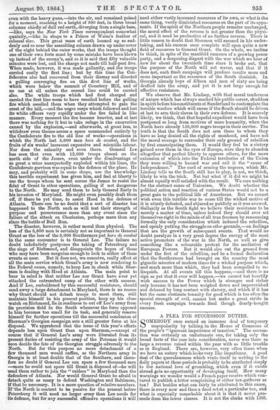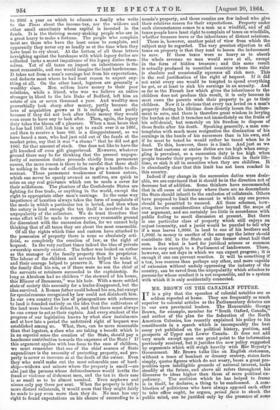A PLEA. FOR SUCCESSION DUTIES.
SOMEBODY once earned an immense deal of temporary unpopularity by talking in the House of Commons of the people's "ignorant impatience of taxation." The accusa- tion was certainly an unfortunate one, for taking only the broad facts of the case into consideration, never was there so large a revenue raised within the year with so little trouble as in England. There are, however, very often times when we have an outcry which looks very like impatience. A good deal of the querulousness which vents itself in writing to the daily papers at these periods is probably to be attributed simply to the national love of grumbling, which even if it exists abroad gets no opportunity of developing itself. How many warnings we wonder would a French paper receive which ven- tured to publish a letter complaining of either tax-gatherer or tax? But besides what can fairly be attributed to this cause, there is every now and then a dead set at a particular tax, and what is especially remarkable about it is that it never pro- ceeds from the lower classes. It is not the clerks with 1501. to 2001. a year on which to educate a family who write to the Times about the income-tax, nor the widows and other small annuitants whose capital is invested in the funds. It is the thriving money-making people who are in a great hurry to make a fortune. The people who complain most are those who have the least cause to complain, and apparently they never cry so loudly as at the time when they have least to cry about. At the bottom of all these letters inveighing against the harshness with which legacy duties are collected lurks a secret impatience of the legacy duties them- selves. Yet of all taxes an impost on inheritances is the most reasonable, and one would imagine the least burdensome. It takes not from a man's earnings but from his expectations, and deducts most where he had least reason to expect any- thing at all. On the other hand, legatees are generally a wealthy class. Men seldom leave money to their poor relations, while a friend, who was we believe an entire stranger in blood to the late Duke of Bedford, left him an estate of six or seven thousand a year. And wealthy men proverbially look sharp after money, partly because the love of acquisition grows as it is indulged, and partly because if they did not look after their money they would soon cease to have any to look after. Then, again, the legacy duty takes the bloom off a pleasure. When a man hears that he has had 1001. left him he is apt to exult over it as 100/., and then to receive a bare 901. is a disappointment, as we have heard a man, who had just sold out of the funds at the market price, say that it was " a shame " that he did not get 1001. for that amount of stock. One does not like to have the gilt knocked off even gift gingerbread. However, whatever ground there may be for thinking that the present unpopu- larity of succession duties proceeds chiefly from permanent causes, the more reason is there to be careful that there shall be nothing in the mode of collection to give a handle to dis- content. Those permanent weaknesses of human nature, which can never be openly avowed as motives, are quick to seize on any real grievance which can be made a cover for their selfishness. The planters of the Confederate States are fighting for free trade, or anything in the world, except the right to appropriate other men's earnings. In the same way impatience of taxation always takes the form of complaints of the mode in which a particular tax is levied, and then when the outcry is loud enough the tax itself is involved in the unpopularity of the collectors. We do trust therefore that some effort will be made to remove every reasonable ground for discontent with the succession duties, for we cannot help thinking that of all taxes they are about the most reasonable.
Of all the rights which time and custom have attached to the possession of property there is none so absolutely arti- ficial, so completely the creation of law, as the right of bequest. In the very earliest times indeed the idea of private ownership scarcely existed. The father was looked on rather as the manager of the family property than its proprietor. The labour of the children and servants helped to make it, and their courage helped to preserve it. When the head of the family died his son, or if there were no son the chief of the servants or retainers succeeded to the captainship. So long as Abraham had no children " the steward of his house, this Eliezer of Damascus," was his heir. With a more settled state of society this necessity for a leader disappeared, but the idea survived. A Roman father could behead his son, but except for specialreasons recognized by law could not disinherit him. In our own country the law of primogeniture with reference to land is founded entirely on the idea that the cultivators of the land were bound to defend it, and that there must always be one owner to act as their captain. And every student of the progress of our legislation knows by what slow instalments and at how late a period the unfettered right of bequest was established among us. What, then, can be more reasonable than that legatees, a class who are taking a benefit which is in an especial sense the creation of the State, should pay a handsome contribution towards the expenses of the State ? If this argument applies with less force to the case of children, we must remember that one of the chief sources of State expenditure is the necessity of protecting property, and pro- perty is never so insecure as at the death of the owner. Even they who could make out the most colourable case of hard- ship—widows and minors where the property is small—are also just the persons whose defencelessness would invite the fraud or violence of dishonest men, and the tax in their case is so small as to be almost nominal. Even nephews and nieces only pay three per cent. When the property is left to more distant collaterals, it would seem that they might fairly be made to pay even more than they do. No man has any sight to found expectations on his chance of succeeding to a. cousin's property, and those cousins are few indeed who give their relatives reason for their expectations. Property under
such circumstances comes to a man as a windfall, and of all
taxes people have least right to complain of taxes on windfalls, whether treasure trove or the inheritance of distant relations. There is, however, another point of view from which the subject may be regarded. The very greatest objection to all taxes on property is that they tend to lessen the inducement to save. If these taxes were so heavy as to absorb the whole revenue no man would save at all, except in the form of hidden treasure; and this same result is actually produced in unsettled countries where the ruler
is absolute and occasionally squeezes all rich men. This is the real justification of the right of bequest. If it did not exist every one would be tempted to spend everything he cot, or at least to sink his earnings in an annuity. And so far as the French law which gives the inheritance to the children does not produce this result, it is only because in most cases the parents wish their property to go to their children. Now it is obvious that every tax levied on a man's property during his lifetime does directly lessen the induce- ment to save, and there is therefore great wisdom in levying the burden so that it trenches not immediately on the fruits of his self-denial, but remotely on his freedom to dispose of those fruits after his death. Speaking generally, a man con- templates with much more resignation the diminution of his earnings in the hands of his successors than in his own, and if he must be taxed he would rather be taxed when he is dead. To this, however, there is a limit. And just as we know that customs or excise duties are too high when smug- gling is prevalent, so a succession duty is too high when people transfer their property to their children in their life- time, or sink it all in annuities when they are childless. It is abundantly clear that this limit has not been reached in this country.
Indeed if any change in the succession duties were desir- able, we are convinced that it should be in the direction not of decrease but of addition. Some thinkers have recommended that in all cases of intestacy where there are no descendants the State should inherit to the exclusion of collaterals. Others have proposed to limit the amount to which any one person should be permitted to succeed. All these schemes, how- ever, involve considerations altogether beyond the scope of our argument, and are certainly too little in accordance with public feeling to merit discussion at present. But there is one particular class of property which still enjoys an unjust immunity, and a jurist would be puzzled to tell why if a man leaves 1,0001. in land to one of his brothers and 1,0001. in money to another of the same age the latter should contribute 30/. to the State and the former about half that sum. But what is hard for juridical science or common sense is easy enough to a Parliament of landowners. These, however, are not days in which we can expect progress ; it is enough if one can prevent reaction. It will be something if a tax, less onerous than perhaps any other, and more capable of extension without unduly oppressing the industry of the country, can be saved from the unpopularity which attaches to persons for whose conduct it is not responsible, and to a system with which it is only accidentally connected.































 Previous page
Previous page